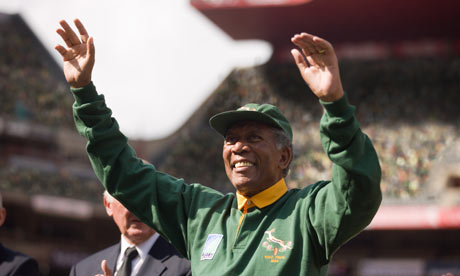
The title is that of WE Henley's inspirational poem from 1875, about one's head being bloody but unbowed, and being the captain of one's soul: a kind of Victorian My Way. Nelson Mandela kept a copy of the poem on him while in prison to keep his spirits up, and in this glassy-eyed movie version of the 1995 Rugby World Cup campaign – in which President Mandela sensationally backed the Springboks, as a brilliant gesture of reconciliation with white South Africans generally – the president gives a copy to the rugby captain François Pienaar. Well, if Henley's poem is good enough for Nelson Mandela, it's good enough for the rest of us, but I can't help finding it a stiff, tightly-buttoned piece of writing, appropriate for this massively inert picture, which looks like a heritage-tourism video.
Morgan Freeman plays Mandela, and Matt Damon is the young, open-minded sportsman Pienaar, and the pair of them seem to be striving to see off all-comers in the Boringness World Cup, and to win championship medals in some sort of global blandness event. This is, to an extraordinary degree, a drama without a crisis, a film populated by no one but good guys: a blank oyster from which the grit has been removed. We know the ending; we know what we're supposed to think and we know who we're supposed to be cheering for: everyone.
Freeman walks carefully and respectfully through the role of Mandela; his approximation of the famous accent is accurate enough, but without spark, as if created with a Stephen Hawking voicebox. As for Damon, he has a little latex to build up the nose, and he does the South African voice, too – but the role plays to Damon's fatal tendency to beta-male dullness. In real life, Pienaar is probably a pungently forceful personality, but here he has to be submissively flavourless in deference to the chief.
Mandela himself is laboriously shown being schooled in the ways of rugby. "Ivory Coast qualifies?" he asks, looking wonderingly at the World Cup wallchart, "how wonderful!" Later, we see him earnestly absorbing the team's priorities: "So it is very important that we beat Australia?" The dialogue is stilted, to say the least.
Clint Eastwood directs a film which is as stately as a Nobel peace prize acceptance speech, or perhaps the inaugural address to some memorial library. A more off-message director might have wanted to contrast the rugby victory with Mandela's troubled home life; or perhaps wonder aloud about the previous attitudes of Pienaar's family; or even put the Springboks' sole black player, Chester Williams, much closer to the centre of the movie. And a more mischievous, less pious kind of film might have hinted that the president was using his saintly prestige as a kind of gamesmanship haka to disconcert foreign players.
The cautiously neutral white-black pairing is of course Hollywood's time-honoured way of dealing with apartheid and African race politics, from Richard Attenborough's Cry Freedom to Edward Zwick's Blood Diamond (set in Sierra Leone) and Bille August's Goodbye Bafana. But there was generally some sort of dark night in the souls of each of the participants, some obstacle, some risk, a sense that they were changing and learning something.
But here, there is no crisis, the relationship between Mandela and Pienaar appears to be smooth sailing all the way. The only dramatic moment comes when, to the astonishment of his bodyguards, the president is discovered unconscious on the ground outside his residence. A doctor is called, diagnoses exhaustion and demands complete rest. But in the very next scene – well, Mandela is back at work, taking calls, interrupting meetings for news about the rugby, all without mishap. The overwork/rest crisis is simply forgotten about!
Perhaps the fact that the movie is set in the first year of that longed-for period, when apartheid was abolished and Nelson Mandela installed as president, has effectively made director Eastwood fatally self-conscious about risking anyone's reputation in the cause of drama. As it happens, Eastwood has himself been involved in a public controversy on the issue of race, angrily shrugging off Spike Lee's criticisms of his Charlie Parker biopic Bird and his alleged failure to acknowledge the contribution of African-American soldiers in his second world war Iwo Jima drama Flags of Our Fathers. But I don't think the Mandela movie is in any sense a riposte on this topic. It is simply a hugely well-meaning but impersonal film, stymied from the outset by the need to pay respectful tribute to all concerned. And in the end, it falls back on the dusty old cliches of the conventional sports film, with the agonisingly drawn-out final moments on the pitch, and the populace in clubs and bars, watching the tense events on their television screens.
I have to say that this denouement was almost unbearably boring. A strange film, like a rugby match with 30 players on one side and no one on the other, solemnly scoring uncontested tries and elaborately congratulating each other after each one.

